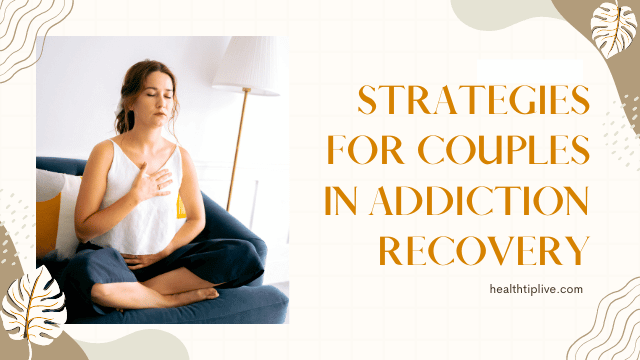Addiction is a multifaceted problem that affects not only individuals but also has a profound effect on relationships, especially romantic ones. An addiction that affects one or both partners can disrupt a relationship and make recovery more difficult. Couples may overcome the obstacles of addiction recovery together and come out stronger than ever before, though, if they have the appropriate techniques and support.
Importance of Strategies for Successful Recovery
Table of Contents
1. Understanding Addiction in Couples
-
Recognizing signs of addiction in a partner
Knowing the obvious indications of addiction is essential to providing a partner with adequate support. These symptoms could be withdrawn conduct, personality or mood swings, disobedience of obligations, and money problems. Couples can avoid relapse by being aware of the signs and symptoms of addiction and taking proactive measures to heal.
-
Impact of addiction on relationships
Addiction has a significant effect on a relationship’s dynamics in addition to the individual. Relationship quality may decline overall, communication may weaken, and trust may be betrayed. Couples who want to address the underlying causes of addiction and work toward individual and relationship rehabilitation must have a thorough understanding of these interactions.
2. Building a Supportive Environment
-
Effective communication techniques
Communication is crucial in every relationship, but it becomes much more crucial when it comes to addiction treatment. Couples must endeavor to create an environment where there is no judgment and where people may openly express their emotions and concerns to one another. Good communication requires active listening, validation, and empathy.
-
Establishing boundaries and expectations
To maintain the strength of your relationship as you recover from addiction, it’s imperative to set clear expectations and boundaries. A couple should decide what constitutes appropriate and inappropriate behavior together, as well as the consequences of breaking them. In addition to promoting responsibility and mutual respect, this safeguards everyone’s health.
3. Seeking Professional Help
-
Importance of therapy and counseling
When it comes to helping couples recover from addiction, individual and couples therapy can be extremely helpful. Couples can explore underlying difficulties, pick up coping mechanisms, and create healthy communication patterns in the safe environment that therapy offers. Support and direction catered to the unique requirements of the pair can also be provided by a licensed therapist.
-
Finding specialized support groups for couples
Couples may benefit from joining support groups designed especially to meet their needs as they recover from addiction in addition to treatment. These meetings offer a helpful environment where couples may talk about their experiences, pick up tips from one another, and acquire important insights into overcoming the obstacles of recovery together.
4. Implementing Healthy Lifestyle Changes
-
Encouraging physical activity and nutrition
In the process of recovering from addiction, leading a healthy lifestyle is crucial for mental and physical health. Regular exercise, eating a healthy diet first, and abstaining from substances that could cause cravings are all ways that couples can support one another. Stress and tension can also be effectively released through physical activity.
-
Managing stress and triggers together
Stress and triggers are common barriers to addiction recovery, but couples can collaborate to create coping mechanisms and provide support for one another during trying times. This could be engaging in fun activities with one another, practicing relaxation techniques like deep breathing or meditation, and asking friends, family, or other recovery community members for assistance.
5. Fostering Trust and Accountability
-
Rebuilding trust through transparency
One of the most important parts of recovery for addicted couples is re-establishing trust.
Honesty, openness, and consistency in conduct are necessary for this. When necessary, partners should be prepared to apologize, accept accountability for their behaviors, and show that they are genuinely committed to making changes. Trust can be progressively restored through good deeds and conversation over time.
-
Holding each other accountable for recovery goals
Maintaining calm and reaching long-term recovery goals require mutual accountability. Setting attainable objectives, keeping track of advancement, and offering support and inspiration along the road are all ways that couples can help one another. This could be going to treatment sessions together, taking part in activities about rehabilitation, and commemorating life milestones as a pair.
6. Addressing Relapse and Challenges
-
Developing a relapse prevention plan
Despite their best efforts, relapse may occur during the recovery process. Create a relapse prevention plan with specific tactics for handling cravings, coping with triggers, and getting help when needed to help couples be ready for this possibility. Couples can reduce the chance of recurrence and sustain their recovery by proactively addressing any obstacles.
-
Strategies for navigating setbacks as a couple
When setbacks occur, couples need to approach them as a team and work together to overcome challenges. This may be going through their relapse prevention plan again, asking therapists or support groups for more help, and making a new commitment to their common objectives. Couples can become stronger and more resilient in their recovery path by overcoming obstacles together with resiliency and determination.
Conclusion
In conclusion, couples have the chance to assist one another during the difficult process of addiction treatment and come out stronger than ever. Couples can navigate the challenges of addiction recovery together and forge a stronger, healthier relationship by comprehending the dynamics of addiction, encouraging open communication, getting professional help, making healthy lifestyle changes, and supporting one another through difficulties.
